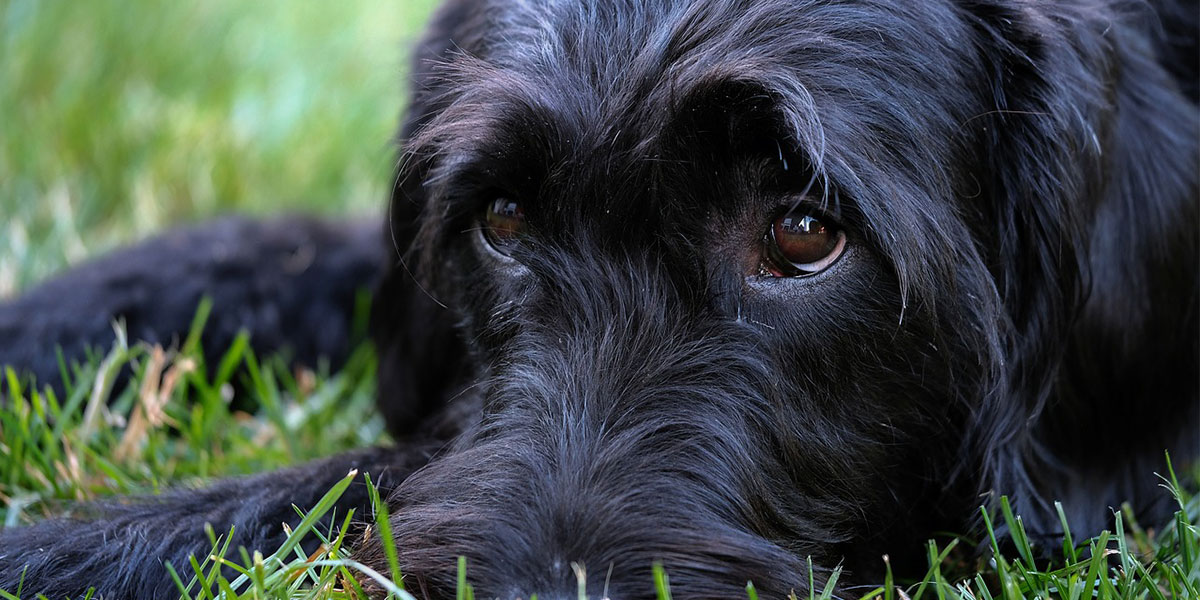Taking too long? Close loading screen.

February 26th
It’s happened to most dog owners. You throw your pup some food, happily watching them guzzle it up. But then you have a moment of panic. What if it’s toxic?
Dogs may seem like they can handle just about any food you throw at them, but you have to be careful what you feed them extra scraps from the table. There are specific foods that are toxic to dogs, and can cause severe cases of food poisoning.
Here, we’ll give you everything you need to know about food poisoning in dogs, and the symptoms you should look out for.
Food poisoning in dogs refers to the reaction that occurs when a dog eats a food that their digestive system can’t handle.
If your dog has had some food that isn’t sitting well, they may have gastrointestinal distress, leading to diarrhea and vomiting. This usually occurs fairly quickly after they eat the food, and in most cases isn’t serious. You simply have to let it pass, feeding the dog a bland diet for the next few days to let their digestive system readjust. You might consider plain rice and cooked chicken. This will be easy on your pup’s stomach.
After an episode of gastrointestinal distress, keep track of your dog over the next few days and see if they still show signs of discomfort. They may be a bit more sluggish and less energetic than normal. This shouldn’t be cause for concern, unless it is severe or lasts for more than a day or so. Also check for blood in your dog’s stool. If you find any blood, contact your vet immediately.
Your puppy may have an eye that’s bigger than it’s stomach. That’s why you should be extra careful about what you feed younger dogs. Their stomachs simply can’t handle many foods, and they are more prone to infection.
If they do get sick, vomiting and diarrhea will wear them out more quickly than it would an older dog. You may have to give them a bit more care and attention. This could include fluids.
You may also consider being more cautious with a puppy and calling a vet sooner if you see any symptoms of food poisoning. It’s always better to be safe than sorry, especially when you’re dealing with a young dog.
There are some foods that dogs simply do not handle well. There are some that are mildly toxic, and will only cause minor discomfort. And then there are some that can seriously harm your dog.
The best way of making sure that you don’t feed your pup anything toxic is checking all of the food in their diet. Most commercial dog foods will be safe, as well as most treats. If you feed your dog any other food, such as fruit or nuts, make sure it’s safe first.
Here are some foods that you should avoid giving your dog:
Avocado
You may be tempted to give your pup some of those overripe avocados sitting on your counter. Although not seriously toxic, avocados should be left out of your dog’s diet
Chocolate
Yes, chocolate really is bad for dogs. The darker the chocolate, the more toxic to your dog, but all chocolate should be avoided when it comes to your dog
Grapes
You may think it’s cute to pop a few grapes in your pup’s mouth. This is best avoided, as grapes contain a toxin that can cause some serious distress for your dog
Nuts
This is a mixed bag. Most nuts, such as peanuts, almonds, pecans, and walnuts, are not toxic. However, the high fat levels can cause stomach distress. If you do feed them to your dog, make sure you only give them a few. And make sure they are unsalted
Raw meat
Remember, your dog is not a wolf. Their digestive tract doesn’t handle raw foods as well as their wild ancestors. And raw meat is can have Salmonella and E. coli, which can lead to severe food poisoning. Be extra careful about feeding puppies raw meat, as they are more prone to infection and their digestive system is more delicate
This is only a partial list of foods that you should look out for. If you are about to feed your dog and you think “Is this toxic to dogs?” it’s probably worth a quick search to find out. In general, it’s better to be cautious when introducing new food items into your dogs diet. And you can always consult your vet on what foods should be avoided.
It can be difficult to know if a case of food poisoning is serious. Dog’s eat a lot of different foods, and sometimes they will react poorly to something that finds its way into their mouth. When should you be worried?
Diarrhea and vomiting are the occasional hazards of owning a dog. But if they last more than a few hours, you should begin to consider calling the vet. This could be a sign of a more serious toxic exposure that could be dangerous .
You should also look out for additional symptoms of severe food poisoning. This may include stomach swelling, difficulty breathing, confusion, and tiredness. If you see any of these symptoms, it’s best to play it safe and call your vet. They can reassure you if it’s not serious, and tell you what you should do if it is.
It can be tempting to throw those extra scraps to your puppy, especially when they give you that look. But the best way of preventing food poisoning is carefully considering every ingredient that goes into your dog’s diet. It’s best if you stick to a controlled diet for your puppy, as they are very sensitive to certain foods.
Still looking for the perfect pooch? Head to our puppy finder to find your next best friend.
Find the Perfect Puppy